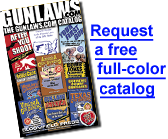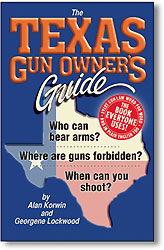
| Home | Books | National Directory | Position Papers | Alan’s Blog | FAQ | New Stuff | Search |
|
Updates for 2009
Download the actual statutes For detailed information on The Texas Gun Owner's Guide, click here.
The Texas Gun Owner’s Guide
NEW TEXAS WEAPON LAWS 2009 11 significant gun laws passed in 2009. Key: TGOG Pg # • Bill # • Statute • Description.
27 • HB267 (SB1188) • PC 46.07 • Texans can now buy firearms and related supplies in any other state where allowed by law. An old rule, limiting residents to only contiguous-state purchases, was repealed. 54, 64 • HB410 (SB838) • GC 411.205, GC 411.187 • The requirement to display your permit to officials on demand is repealed, and the punishment section is amended to remove the penalties. [NOTE: This bill passed in final form as part of the 244-page DPS revision law, HB2730, and will be posted here soon.] 83 • HB1020 • EC 37.07 • A student may not be expelled for use, exhibition or possession of a firearm if it occurs at an approved off-campus target range, while preparing for or participating in a school-sponsored competition or a shooting sports educational activity, which is sponsored or supported by the Parks and Wildlife Dept., or a shooting sports sanctioning organization working with the department. 138 • HB1805 • PWC 62.005, 62.0056 • A hunter with a physical disability that prevents use of a traditional firearm-sighting device may use a laser sight, and is exempt from the hunting-with-lights ban, under limited conditions. The hunter must carry a doctor’s note certifying the condition, use the laser sight during regular hunting hours, and be assisted by a person who is not disabled, has a hunting license and is at least 13 years old. 77, 80, 81 • HB2664 • PC 46.035 • A CHL holder has a defense to prosecution for being on the premises of a liquor-serving establishment (the type that must post “51” signs), if the person did not get “effective notice.” This provides CHLs a degree of protection if a place fails to post the sign, or posts it in a way that could be overlooked or not recognized. 21, 47 • HB3352 • GC 411.052, 411.0521, HSC 574.088 • Clarifies that a prohibited possessor includes (among others): DPS is required to provide only the information necessary to identify prohibited possessors, to the NICS background check database run by the FBI. Those persons shall have access to their own information, which is otherwise confidential except as provided by law. DPS must have a procedure to correct the information and send the corrections to the FBI. A person seeking relief must provide a copy of a judicial order that the person is no longer incapacitated or is entitled to relief under HSC 574-088, or proof of relief under the federal rights-restoration statute, 18 USC §925 (which has been suspended and of no use since 1992, as affirmed by the U.S. Supreme Court in 2003). A person seeking rights restoration is authorized to petition the court for the needed orders, and the court must consider evidence to ensure the person is indeed qualified to have rights restored, including: 1- circumstances that led to the disability under federal law (18 USC §922(g)(4)), the person’s mental history, criminal history and reputation. The court must officially state that the person is no longer likely to act in a manner dangerous to public safety, and removing the person’s disability to purchase a firearm is in the public interest. Courts are required to provide relevant mental health dispositions to DPS, including disqualifying and relief-from-disabilities findings, within 30 days of determination. The notification must include detailed identifying information for the person and copies of relevant court orders. Court clerks are required to provide back records from Sep. 1, 1999, by D • HB4336 (SB2225) • PC 46.14, PC 71.02, CCP 59.01 • Having, transporting or transferring a firearm that was obtained illegally is a 3rd degree felony. If three or more firearms are involved it is a 2nd degree felony. If the activity is done for profit or other remuneration, the next higher category of penalty applies, and other charges may be added. Police officers acting in the line of duty are exempt. 89 • HB4456 • PC 46.01 • Clarifies that certain knives designed to open easily are not switchblades. A switchblade “does not include a knife that has a spring, detent, or other mechanism designed to create a bias toward closure and that requires exertion applied to the blade by hand, wrist, or arm to overcome resistance and open the knife.” 46 • SB1236 • CCP 14.06 • A citation issued for a class C misdemeanor domestic-violence offense must include a statement in bold, underlined capital letters warning the person that a conviction could remove the person’s right to keep and bear arms under federal and state law. Before a defendant enters a plea of guilty or of no contest to a domestic-violence misdemeanor, the court must give the same warning, orally or in writing (if only a fine is involved, the written statement on the citation is deemed sufficient). 56 • SB 1424 • GC 411.171, 411.172, PC 46.04 • For the purpose of prohibiting eligibility for a CHL, a felony does not count if it has been vacated, set aside, annulled, invalidated, voided, or sealed under any state or federal law (in addition to expunged or pardoned). A felony is determined at the time it is committed (used to be at the time of application for a CHL). If the law was a misdemeanor at the time, or doesn’t contain all the elements of a felony, it is not considered a felony for the purpose of denying a CHL. The specific conditions that constitute a felony in Texas, another state or under federal law are spelled out. 102, 113 • SB 1742 • LGC 229.002 • Municipal control over discharging a shotgun, air rifle or pistol, BB gun or bow and arrow is increased by allowing regulations for discharge within 1,000 feet of an occupied building including a residence located on another property (used to be 150 feet), or within 1,500 feet from a school, day-care facility, nursing home, adult day-care facility, or the property line of a public tract used for outdoor recreation, a residential subdivision or a multi-family residential complex. Discharge of a centerfire or rimfire rifle or pistol in any caliber can now be regulated in the same areas as above (the occupied-building limit used to be 300 feet). BLOOMFIELD PRESS “We publish the gun laws.” 4848 E. Cactus #505-440 • Scottsdale, AZ 85254 1-800-707-4020 Orders • 602-996-4020 info@gunlaws.com GunLaws.com Get your copy of The Texas Gun Owner’s Guide “It doesn’t make sense to own a gun and not know the rules.” Approved by the Texas Dept. of Public Safety for To help protect your right to keep and bear arms, Call, click or write for our free full-color catalog! Sign up online for email updates and gun-related news.
|
 on gun laws and other topics.
|


